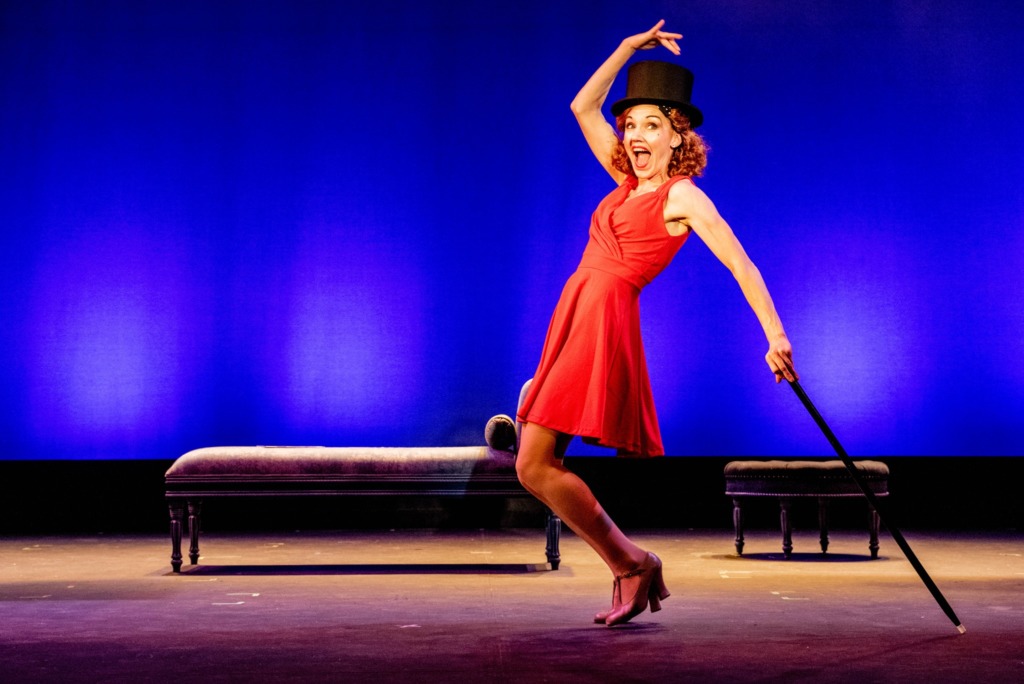Most shows feature a tried-and-true pattern of opening with a traditional “I Want” song, which details the leading character’s hopes and wishes for the rest of the story. Sweet Charity, currently playing on the main stage at Cockpit In Court at CCBC Essex, Directed by Cockpit veteran Eric Potter, is an entire show full of hopes and dreams and wants and desires, most of which are quickly dashed for the taxi dancers at the Fandango Ballroom, where everyone comes until they can land the next best job and never leave.

The 1966 musical boasts an impressive pedigree with a book by master comedian Neil Simon and a score by the incomparable Cy Coleman with lyrics by Dorothy Fields, and is based on Federico Fellini’s 1957 film Nights of Cabiria, concerning the day-to-day ups and downs in the life of a prostitute. Simon softened the career to a dance hall hostess, which takes some of the reality and grit away from the punch of the character, not to mention the climax of the story (although there are a few offhand allusions to the fact that prostitution isn’t necessarily off the menu for some of the hostesses). Renamed for the almost too precious moniker Charity Hope Valentine (you see, she’s an eternal optimist, not Simon’s most subtle move as a playwright), the show became a success in its day due solely to the magic of its pairing of an up-and-coming revolutionary director/choreographer Bob Fosse and his forever muse, the luminous Gwen Verdon, which is the piece’s liability. Simon’s book is far from his best work and feels dated and creaky in today’s rearview mirror.
Coleman’s score fares much better, mostly because he is possibly the most prolific composer in American Musical Theater, the only one that truly doesn’t have a “style”, but adapts his considerable talents to whatever the piece demands. Circus music for Barnum. Operetta for the art deco railway farce On the 20th Century. 70’s funk and disco for the Times Square hooker and drugs soap opera The Life. And here he has composed a score of showcase character numbers engineered for the unique talents of the legendary Verdon, many which have profited to become classic commercial jingles to add to their longevity. Iconic songs like “Hey, Big Spender”, “If My Friends Could See Me Now”, and “There’s Gotta Be Something Better Than This” have etched their way into pop culture history and still stand up inside the featherweight premise and Borscht Belt delivery of Simon’s adapted story. And from the classic bombastic opening strains of “Hey, Big Spender”, music director Nathan Scavilla conducts a top notch orchestra to give them all the necessary punch.
Potter gets great support from a lively supporting cast, most notably Natalie Knox as wise cracking sidekick Nikki and Katie Sheldon as a very faded, jaded southern belle Helene, both of who’s bloom has fallen far from the roses they initially were before taxi dancing consumed their dreams and their souls (see how silly that sounds when they’re no longer prostitutes?) Both Knox and Sheldon have the biting comic timing of cast-offs from Designing Women and the dance abilities to carry off choreographer Ilona Kessell’s showstopping “There’s Gotta Be Something Better Than This.” They also share a beautiful, introspective, bittersweet moment with their duet “Baby, Dream Your Dream”, a sincere respite from the otherwise hard knocks at the Fandango.
Troy Haines-Hopper also stands out with a fun cameo as Daddy Brubeck, the high-spirited evangelist who heads the Rhythm of Life Church (stylized by costume designer Eva Grove as a Jimi Hendrix wannabe.) Potter and Kessell’s clever staging of his “Rhythm of a Life” as if it were lifted out of a road company of Hair gives the show a brief and very welcome breath of period levity to give a much-needed break from the depression and broken dreams that haunt the bulk of the show.

Alexander Conte is a charming mess as Oscar, an anxiously manic love interest, the could-be nice guy answer to Charity’s prayers. He gamely makes the best of Simon’s heavy-handed, amateurish treatment of his character who starts out as a quirky breath of fresh air but is quickly reduced to a 2-dimensional plot device. Conte gives his all and has a nice vocal moment with the show’s title song, but is undermined by the weak, forced ending Simon has crafted for Oscar, possibly the worst-written character in his illustrious catalogue. Again, his character’s resolution would make much more sense if Charity were in fact a prostitute, but just makes Oscar look childish and silly in the watered-down context.
Only Mark D. Macaluso struggles a bit as Italian matinee idol Vittorio Vidal. Although he continuously drifts in and out of his indeterminable accent, Simon also does him no favors as yet another 2D plot device whose sole purpose in the show is to set up Verdon’s big solo showstopper “If My Friends Could See Me Now.” When the number is over, the character is of no further use and disposed of immediately.
The root of the multiple problems with this show lie in the reality that it was conceived from the beginning by Fosse solely as a showcase vehicle for the otherworldly talents of the sublime Verdon, the inspiration for all his best work. Over the years, the role has been inhabited by many other illustrious dance divas including Fosse acolytes Chita Rivera and Anne Reinking, Donna McKechnie, Debbie Allen, and more recently Christina Applegate and Sutton Foster. Huge dance heels to fill all around.
And here is where the show ultimately works. Potter’s inspired coupling of Kessell, the Baltimore area’s foremost interpreter of Fosse and keeper of his terpsichorean flame, with the white-hot stellar Becca Vourvoulas as Charity to masterfully execute her vision. Vourvoulas dances with the isolated precision of a young Gwen Verdon. She sings with the glorious belt of a young Ethel Merman. She delivers comedy with the razor-sharp aplomb of a young Lucille Ball. And she possesses a once-in-a-lifetime case of sheer star quality to mix it all up and sell it together. Her vivaciousness salvages the show form its own weight. I personally can’t think of another local actress with not only the triple threat ability to perform the role, but with Vourvoulas’ unique flair to salute Verdon and all her other iconic successors in a way that none of her peers ever could. I daresay that even with all the talented actresses this town has produced over the time I’ve been active in the theatre community, there has never been anyone who can inhabit Charity’s 3” DeLuca heels with the precision and radiance of Miss Vourvoulas.

Kessell’s choreography is full of all of Fosse’s stylized isolations and exciting visual flair. Even aside from Vourvoulas, she gets great execution from Knox and Sheldon who keep up with Vourvoulas on the frenetically determined “There’s Gotta Be Something Better Than This”, a fun little acid trip in “Rhythm of Life”, a divine chorus line of dance hall burnouts in “Hey, Big Spender” and (along with lone featured male dancer Ryan Holmes) in the recreation of the show’s infamous set piece, “Rich Man’s Frug.”
On the tech side, Set Designer Michael Rasinski uses a minimalist style of wisely chosen furniture pieces and free-standing partitions that work well in the 60’s period milieu, especially when accented by flawless, colorful lighting from designer Thomas P. Gardner. Eva Grove provides a colorful array of beautiful period costumes from the jewel-toned dance hall dresses to the black and white feathered ostentatiousness of “Rich Man’s Frug” and, most effectively, choosing the influence of Applegate’s red dance dress for Charity, which perfectly flatters Vourvoulas’ lean dancer’s build, over the iconic black tank top minidress of all Charities before.

In an aside, a frequently overheard complaint from within the audience, Cockpit In Court no longer utilizes traditional programs, not even the single page format where the patron must visit a website to look for anything other than the most basic information. Now you are asked to scan a QR code and use a digital program on your phone—the same phone they insist you turn off and not use during the performance when one needs the program the most. It is shameful and cheap-looking when all the smaller theatrical companies around town without institutional funding can manage to provide at least a modest, nicely printed program for their patrons to appreciate and explore the production and the performers—not to mention advertisers who pay handily for exposure—more easily, but one of the area’s oldest and most prominent, high-profile companies can’t, despite the fact that they have their own in-house printing department on campus, just looks tacky. It’s flat out embarrassing for an institution currently hailing their 50-year history of significant theatrical contribution. It also makes it unnecessarily more difficult to impossible for a critic to find the information they need to give a proper positive review once they’ve gone home and lost the page. Just saying…..
But excuse the PSA digression. Overall, if any critic or audience member questions the relevance or necessity for a golden age musical like Sweet Charity, one only has to venture to Cockpit in Court and experience the powerhouse performance of the season of Becca Vourvoulas to make a case that, in the right hands, they still serve a purpose greater than the surface interpretation most armchair critics hold classic musicals to today. And you’re in the right hands with Potter, Kessell, and Vourvoulas. If her friends could see her now, indeed.
Running Time: Approximately 2 hours and 30 minutes with one intermission
Sweet Charity plays through August 7, 2022 on the main stage of Cockpit in Court in the F. Scott Black Theatre of The Robert and Eleanor Romadka College Center at the Community College of Baltimore County Essex Campus— 7201 Rossville Boulevard, Essex MD. For tickets call the box office at (443) 840-2787 or purchase them online.
